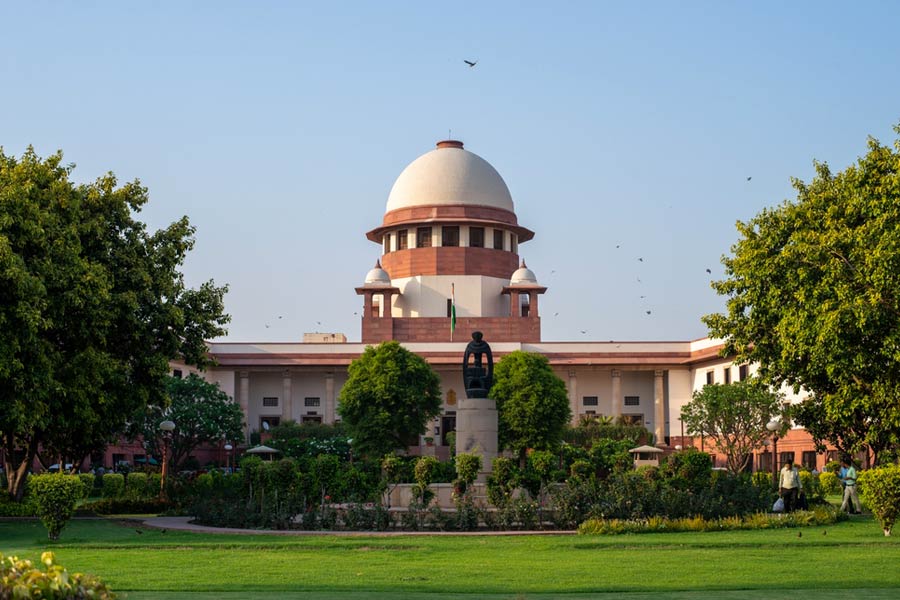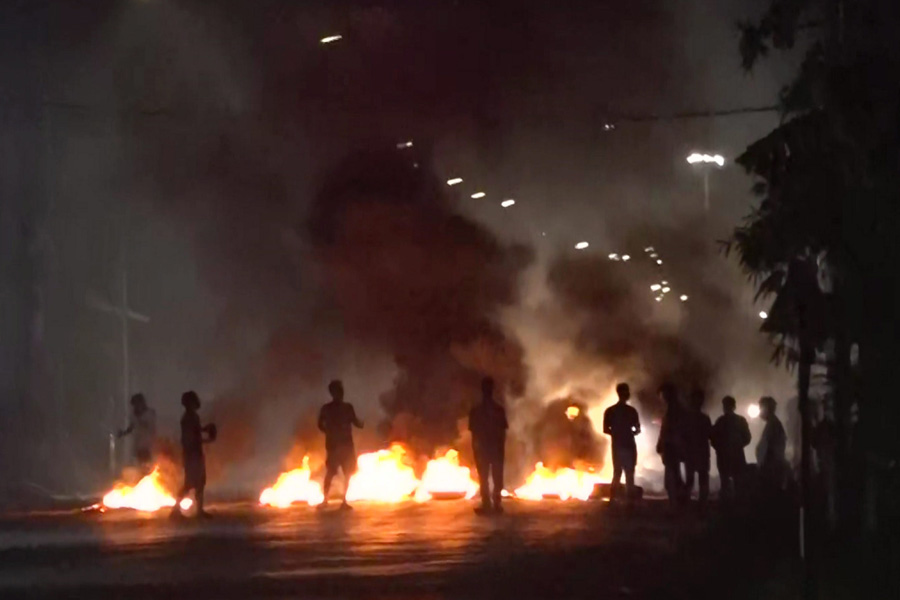The BJP-led government in Manipur has used the Internet ban in the state to its advantage and did not readily apprise the Supreme Court of gruesome attacks against the Kuki-Zo communities, a lawyer told The Telegraph on Wednesday.
Seitinmang Haokip, who spoke to this newspaper, is one of the lawyers assisting Colin Gonsalves, a Supreme Court senior advocate who is representing the petitioners in connection with a Manipur case the apex court is hearing since May 8.
“The tales of atrocities could not come out because there was a ban on the Internet (now partially lifted) and the state government used it to its advantage and suppressed information.... This began from Day One when the Supreme Court took up the petition on Manipur and began hearing them together on May 8,” said Haokip, who is also a member of the legal team of the Manipur Tribals’ Forum, Delhi.
A bench of Chief Justice D.Y. Chandrachud and Justices P.S. Narasimha and J.B. Pardiwala began hearing a batch of petitions on May 8 — five days after violence erupted in the northeastern state — that urged the apex court to direct the Centre and the state to ensure the safety of the tribal people who had to flee their homes in the face of attacks from the majority Meitei community.
The petition — which also alleged that the attacks on the tribal communities in Manipur had the support of the BJP — pleaded with the court to direct the Centre and the state government to deploy central forces to protect all churches and places of worship of the tribal/ Christian population in Manipur with immediate effect.
“We moved the petition as the state was burning and the Kuki-Zo communities were under unprecedented attack. Village after village was being set on fire and people were being killed because of their ethnic identities.... Sadly, the solicitor-general told the court otherwise,” said Haokip, who along with six others, is compiling a list of atrocities committed in Manipur.
According to him, the order passed by the court on May 8 bore proof that solicitor-general Tushar Mehta, representing the state and the Centre, was unable to present to the bench the true picture on the ground.
“The Solicitor-General states that as a consequence of the measures which have been adopted, no violence has been reported in the State during the course of the previous two days and the situation is gradually returning to normalcy; curfew was relaxed today for a period of three to four hours across the State of Manipur in addition to the relaxation for a few hours yesterday in various parts of the State,” the Supreme Court bench wrote in its order.
The order also mentioned the steps, which Mehta had apprised the court of, that had been taken to deal with the violence before it ordered adequate measures to protect places of worship and posted the pleas for hearing on May 17. The state government was asked to file a status report by then.
The Telegraph spoke to Mehta on Wednesday night to obtain his comments. The solicitor-general said he does not discuss outside the court “matters in which I am appearing”.
A news report filed on May 8 by this newspaper’s Supreme Court correspondent had quoted Mehta as informing and requesting the bench: “On the ground situation, the army and other organisations are working round the clock. Let the situation calm down a bit. We can take this up after a week or 10 days.”
Multiple sources in Manipur told this newspaper that while the court was informed that no violence was reported in the state, the reality was different on the ground.
A copy of an FIR, registered in Andro police station in Thoubal police district on May 7, says that in the “intervening night of 6th May and 7th May, some unknown persons numbering about 200-300 came into the following villages (names) and set on fire some houses of the villagers.
“Due to fire, one woman namely Smt Thiandam Vaiphai, 45 years d/o Late Laltinkhai Vaiphei of Pheitaiching Vill, was burnt and died near her house located at Pheitaiching near Gotengkot village. Unknown miscreants... escaped from the spot after setting fire. Hence, suo moto FIR No 25 (5) 2023 Andro PS U/S 147/148/149/384/302/427/ 436/34 IPC is registered for investigation.”
According to a police source, a team from Andro police station, troops of Gorkha Rifles at Andro and two tribal villagers picked up the charred body of the woman from Pheitaiching village in the presence of several villagers.
“If someone is burnt alive and homes in scores of villages are turned into ashes, how can the solicitor-general inform the Supreme Court that the situation is gradually returning to normal?” asked the police officer.
This officer also felt that the state government had been misrepresenting facts to the solicitor-general as part of a larger attempt to hide the atrocities.
This misrepresentation, the lawyer said, was probably the reason the Supreme Court took the government assurance, communicated to the court by the solicitor-general, at face value.
“The fundamental rights of tens of thousands of people were trampled upon for over two months.... We had even filed interlocutory applications stating specific instances of violence when the court went into vacation after the second hearing on May 17. But the state government kept misrepresenting facts and that probably came in the way of the court passing any concrete order,” said Haokip.
Now that the bench has taken suo motu cognisance of the situation — after the video of two women being savaged by a mob went viral — and indicated that it would step in if the government doesn’t act, lakhs of people belonging to the tribal communities are resting their hopes on the apex court, where the matter will come up for hearing on July 28.












